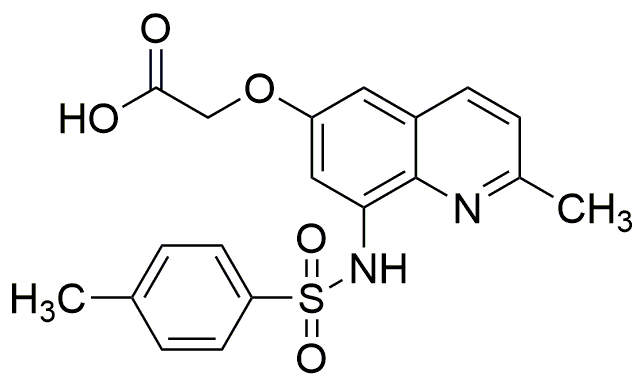Zinquin is widely utilized in research focused on:
- Fluorescent Probes: It serves as a highly effective fluorescent probe for detecting zinc ions in biological systems, helping researchers study zinc's role in cellular processes.
- Cell Imaging: Zinquin is used in live-cell imaging applications, allowing scientists to visualize zinc dynamics in real-time, which is crucial for understanding various physiological and pathological conditions.
- Neuroscience Research: This compound is instrumental in neuroscience studies, particularly in exploring zinc's involvement in neurotransmission and its implications in neurodegenerative diseases.
- Drug Development: Zinquin's ability to selectively bind zinc makes it valuable in drug formulation processes, particularly for developing therapeutics targeting zinc-related pathways.
- Environmental Monitoring: It is applied in environmental science to assess zinc levels in ecosystems, aiding in the evaluation of pollution and its effects on wildlife.
Informations générales
Propriétés
Sécurité et réglementation
Applications
Zinquin is widely utilized in research focused on:
- Fluorescent Probes: It serves as a highly effective fluorescent probe for detecting zinc ions in biological systems, helping researchers study zinc's role in cellular processes.
- Cell Imaging: Zinquin is used in live-cell imaging applications, allowing scientists to visualize zinc dynamics in real-time, which is crucial for understanding various physiological and pathological conditions.
- Neuroscience Research: This compound is instrumental in neuroscience studies, particularly in exploring zinc's involvement in neurotransmission and its implications in neurodegenerative diseases.
- Drug Development: Zinquin's ability to selectively bind zinc makes it valuable in drug formulation processes, particularly for developing therapeutics targeting zinc-related pathways.
- Environmental Monitoring: It is applied in environmental science to assess zinc levels in ecosystems, aiding in the evaluation of pollution and its effects on wildlife.
Documents
Fiches de données de sécurité (FDS)
La FDS fournit des informations de sécurité complètes sur la manipulation, le stockage et l’élimination du produit.
Spécifications du produit (PS)
Le PS fournit une description complète des propriétés du produit, notamment sa composition chimique, son état physique, sa pureté et les exigences de stockage. Il détaille également les plages de qualité acceptables et les applications prévues du produit.
Certificats d'analyse (COA)
Recherchez des certificats d'analyse (COA) en saisissant le numéro de lot du produit. Les numéros de lot et de lot se trouvent sur l'étiquette d'un produit, après les mots « Lot » ou « Lot de fabrication ».
Numéro de catalogue
Numéro de lot/série
Certificats d'origine (COO)
Ce certificat d'exploitation confirme le pays dans lequel le produit a été fabriqué, et détaille également les matériaux et composants utilisés et s'il est issu de sources naturelles, synthétiques ou autres sources spécifiques. Ce certificat peut être requis pour les douanes, le commerce et la conformité réglementaire.
Numéro de catalogue
Numéro de lot/série
Fiches de données de sécurité (FDS)
La FDS fournit des informations de sécurité complètes sur la manipulation, le stockage et l’élimination du produit.
DownloadSpécifications du produit (PS)
Le PS fournit une description complète des propriétés du produit, notamment sa composition chimique, son état physique, sa pureté et les exigences de stockage. Il détaille également les plages de qualité acceptables et les applications prévues du produit.
DownloadCertificats d'analyse (COA)
Recherchez des certificats d'analyse (COA) en saisissant le numéro de lot du produit. Les numéros de lot et de lot se trouvent sur l'étiquette d'un produit, après les mots « Lot » ou « Lot de fabrication ».
Numéro de catalogue
Numéro de lot/série
Certificats d'origine (COO)
Ce certificat d'exploitation confirme le pays dans lequel le produit a été fabriqué, et détaille également les matériaux et composants utilisés et s'il est issu de sources naturelles, synthétiques ou autres sources spécifiques. Ce certificat peut être requis pour les douanes, le commerce et la conformité réglementaire.


